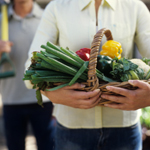Learn more about Sustainable Food |
|
 |
Locally Grown Food Buying food from within your community can help preserve habitat for wildlife, save energy, and grow your local economy. |

|
Organic Food Organic food is produced by farmers who emphasize the use of renewable resources and the conservation of soil and water to enhance environmental quality for future generations. |
 |
Community Garden Community gardens provide multiple benefits for the surrounding neighborhood. Gardening is a source of exercise and social interaction that can simultaneously offer residents nutritious food while reducing the family food budget. Harmony, currently has 41 garden beds of varying sizes available to residents at no charge. As with most community activities certain operating policies need to be met to ensure enjoyment for everyone. Residents wanting to grow produce at home but are worried that they do not have enough space may want to plant a mini-garden around their patio area. Mini-gardens can provide a wide variety of produce within a relatively small space. Read more here. |

Sustainable Food
The types of foods we buy, where they are produced, and the techniques used to grow them, can affect our personal health and the health of our environment. Purchasing food from community supported farms, farmer's markets, and produce stands can help support your local economy and it saves energy. Most of the produce available in grocery stores is transported from locations hundreds or thousands of miles away. During its trip from the farm to our store, fresh produce must be refrigerated. The fuel used to transport and refrigerate food requires a lot of energy to be spent. Produce also loses nutrient content during its long trek to our table. Nothing compares to the freshness and taste of locally grown produce!
Organic farming is rapidly gaining popularity, and it is practiced in approximately 120 countries throughout the world. Certified organic food is produced by farmers who emphasize the use of renewable resources and the conservation of soil and water to enhance environmental quality for future generations. Organic meat, poultry, eggs, and dairy products come from animals that are given no antibiotics or growth hormones. Organic food is produced without using artificial colors or preservatives, synthetic pesticides or fertilizers, sewage sludge, genetically modified organisms, or ionizing radiation.

